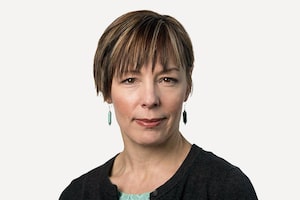
Paramedics and ambulances are seen outside the emergency department at Burnaby Hospital in Burnaby, B.C., on May 30.DARRYL DYCK/The Canadian Press
The B.C. government is expected to table a new deal for family doctors in October, promising a better compensation model to address rising business costs, and to provide physicians with an alternative to the current fee-for-service payment system.
The province announced on Sept. 29 a 70-point plan to fix an unravelling health care system, in response to emergency room closings, delays in ambulance response and growing wait lists for critical treatment. But a core challenge is access to primary care: One million British Columbians don’t have a family doctor.
The shortage of family doctors is not new. In 2010, then-health services minister Kevin Falcon promised an overhaul of primary care to ensure that every British Columbian would have access to a family physician within five years. In May, 2018, Premier John Horgan promised to address the still-persistent lack of family doctors, saying his plan would ensure “British Columbians get the health care they need faster and closer to home.”
Instead, the pandemic arrived and pressure on primary health care increased.
In May, the head of Doctors of BC met with Mr. Horgan and Health Minister Adrian Dix to discuss the challenge. Contract talks were already under way to set the overall compensation agreement for all doctors, but that meeting led to a second table looking at a new payment model for general physicians who work under fee-for-service and provide long-term care for a returning set of patients – the traditional family practice.
Having two separate negotiations underscores that the doctors’ bargaining association does not want to redistribute the resources they get from government: This new model will come with a new pot of money.
“The COVID pandemic amplified a series of things, including inequities across different family medicines and specialties,” said Josh Greggain, president-elect of Doctors of BC.
“It’s going to be a significant shift in how we provide care,” he said in an interview. The goal is to better support family physicians who are still in practice, to encourage family doctors who have left to return to that line of work, and to make family medicine “the best, most attractive, most irresistible option for upcoming physicians.”
Mr. Dix said the fee-for-service plan doesn’t work for a new generation of family doctors, and the province wants to move away from that compensation model, which was created in the 1960s as a condition of doctors joining Canada’s first universal health insurance plan.
But he noted that many B.C. doctors won’t embrace reform. While other provinces have been shifting away from fee-for-service compensation, B.C. has been slow to move, with many doctors still supportive of the model. In B.C., 80 per cent of physicians bill this way, compared to 45 per cent of Ontario doctors.
“This was the model that we started with, it worked for a long time,” Mr. Dix said in an interview. “And then it stopped working.”
He said the exodus of family doctors from the traditional, relationship-based practice reflects a growing disenchantment with the current system. ”Fundamentally, I think the options have to be better because the younger doctors don’t want to run the business.”
Of about 6,800 family doctors registered in B.C., only about 3,100 are doing community-based, comprehensive family medicine, according to the BC College of Family Physicians, a member-based association that advocates for the future of family medicine. The balance of family doctors are providing other services – such as urgent care, working in hospitals and other settings.
“So family doctors, they are not working in the community, but in more desirable locations such as in the hospital,” said the association’s vice-president, Justine Spencer, who practises family medicine and maternity care in Vancouver.
She noted the crisis is not a shortage issue but a distribution issue. “The bottom line is we need to change how family doctors are paid in order to make being a family doctor in the community a financially sustainable career choice,” Dr. Spencer said.
Rita McCracken, assistant professor in family medicine at the University of British Columbia, helped conduct a survey in 2021 that found the majority of physicians working under the Vancouver Coastal Health authority were interested in moving away from fee-for-service.
Dr. McCracken, who is also a community-based family physician in East Vancouver, said Doctors of BC has actively campaigned against changing from fee-for-service. “I think one of the big problems is that the professional physician leadership organization, they’ve continued to manage all the conversation and they have failed to inform their members. And they have continued to elect members who represent this very antiquated approach to providing primary care,” she said.
She said she hopes to see a model that is going to allow family physicians to provide robust team-based care that’s going to increase access for those who don’t have a family doctor. “And, frankly, I don’t actually have a lot of hope that that’s going to happen. … I hope I’m wrong.”
 Justine Hunter
Justine Hunter Xiao Xu
Xiao Xu